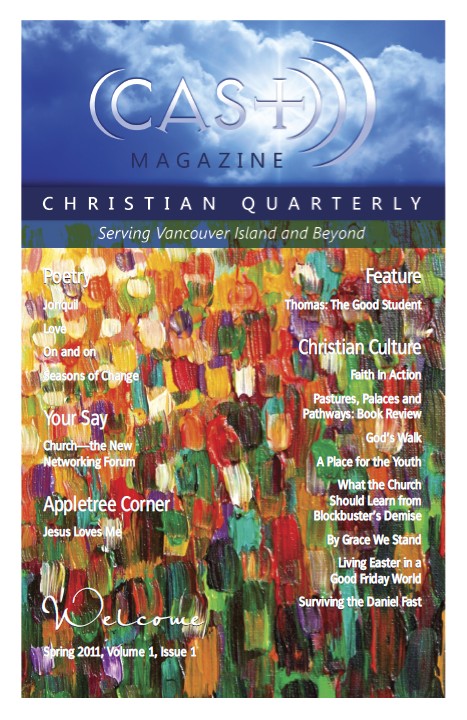Interview with Canadian Pulp Fiction, Manga, and Sci-Fi Fantasy writer Calvin Daniels.
TB: I’d like to welcome you, Calvin, to Author’s Dialogue. You’ve had a long and interesting writing career; could you tell us when and why you started writing?
CD: I actually got my break winning a sports trivia contest in hometown paper, which led me to offer to do a sports 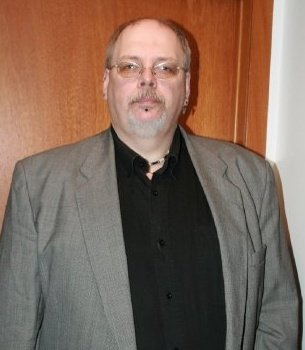 column for them. I wrote a sample three-parter, which they ran as one column. I ended up doing a 1,000 words a week on sports for the next decade.
column for them. I wrote a sample three-parter, which they ran as one column. I ended up doing a 1,000 words a week on sports for the next decade.
Shortly after starting the column, they asked me to fill in when they were short-staffed, and just sort of stayed on. I’ve moved to Yorkton since, but that was about 24-years ago.
TB: What have been your best and worst experiences as a writer?
CD: Worst hmmmm, answering questions about myself maybe. Seriously the bad are rare, although in a weekly newspaper the mundane drag after nearly a quarter of a century.
Best—that list is much longer.
Holding my first book, and each of the six since.
Twenty-five Saskatchewan Weekly Newspaper Association awards of excellence. Wish they came with a bonus.
Interviewing icons such as Tommy Hunter, Todd McFarlane (famous for Spawn comic), Mr. Dressup, several National Hockey League Hall of Famers, the last four Premiers of the province, and dozens of just ordinary people with great stories.
TB: How have those experiences prepared you for being an author?
CD: The newspaper work at least creates some discipline. But, to do fiction it’s more imagination, and love of Sci-Fi, reading, observing life that aids the process.
TB: Please tell us about your latest work.
CD: That’s a tough question in as much as latest work is a bit hard to identify. Unit 13 – The Horrors of Altenschatten is last in print effort. It sort of recalls comics of my youth, although this is a novel co-written with Tyrell Tinnin of Wichita.
The story has elements of Sgt Rock & the Howling Commandoes, and Weird War comics. It follows a secret unit in WWI behind enemy lines. The unit has some ‘unique’ powers among them, and the Germans are doing ghastly experiments which must be stopped.
At the same time The Starling, Crake & Crane Casefiles, Ghost Wind #2 and Black Wolf #3 are all in progress as well.
TB: What were your inspirations for writing it?
CD: A love of pulp fiction, old action comics, and Sci-Fi-fantasy in general.
TB: Are you a “blank-pager,” or do you utilize an outline?
CD: What is an outline? That would be way too much preparation, and too confining once started.
That is especially true for a co-write project. We use a sort of follow-the-leader process. I start the books ad then we do a chapter each in turn (generally). It really keeps it fresh because you never know exactly what twist the other writer might include.
There are characters which are ‘protected’ of course, but other than that we just let it flow.
TB: To what degree are your fictional characters based in reality?
CD: Well if you included an author’s twisted view of reality, then it all is. I will assume you mean a bit more mass view of a reality, so let’s see. Granton City is roughly Chicago in the 1920s. If we reference a baseball player or historic event we do check to make sure it fits the period.
That said, there is magic, weird tech, limited superpowers, so it’s definitely not true to life either.
TB: Briefly share your thoughts on traditional publishing vs. indie.
CD: Having done both, both have merits. It’s great having a publicist set up signings, and great having them distributing—it’s hard for indies to get in many bookstores.
That said pulps are a small niche. In talking to one publisher it would have been a year to publish, if they accepted the book. We have four books out in that time. Remember pulps came out in vast numbers in the past. They were quick reads. We want to mimic that.
TB: Is there a different genre you would like to try writing?
CD: I am involved in an alternate reality western story for another publisher that is proceeding very slowly, with delays on the other end. That is one I really want to see complete.
Steampunk, a cousin to pulps in my mind, is another one I want to delve into one day.
I also have a really dark and twisted fantasy I would like to see in print, just need a co-writer to push it forward—hint, hint anyone!
TB: Can you tell us a bit about your next project?
CD: Let’s see. Ghost Wind #2 – The Runaway Princess is in the edit phase. The hero is thrust into the role of protector for a princess wishing to escape her pre-ordained role in the balance of power, and is on the run from it. Again very manga-influenced pulp from myself and co-writer Mitchel Rose.
The Starling #1 from Anthony Garcia and myself is nearing the halfway point. It is the first solo adventure for The Starling who debuted in Black Wolf and is a member of Unit 13. Now a covert assassin The Starling must survive the web of lies and intrigue of 1920s Burma to carry out her mission.
Sean Kasper and I are at work on Crake & Crane Casefiles. Crake is the hardtack Sergeant from Unit 13 now in Granton City after WWI. He teams with the local coroner (Crane) to become a sort of ‘Odd Couple’ detective duo, on the search for a missing rich girl. The most ‘real life’ of the titles.
And Black Wolf #3 with Kevin Lee is just started. It will include a crossover cameo with another writer’s pulp character (a secret for now), introduce a new Granton City Press heroine, (or is she?), and will tie in with the background of reoccurring support character Pogs and Paully.
TB: Describe your ideal conditions or surroundings for writing.
CD: Anywhere, although 5th Avenue Cup & Saucer in Yorkton has become a favored haunt. My coffee table with baroque music playing works too.
TB: Do your dreams influence your writing?
CD: More the other way around. I often go to sleep with visions of Granton City Press characters dancing in my head. Beats sugarplums I suppose.
TB: I am aware that you have co-authored a number of pieces, can you give us a summary of the works?
CD: All the Granton City Press books are co-authored. My first three books, all hockey-themed were solo efforts.
TB: What advice can you share with writers who are just starting out?
CD: Write regularly. Make it important in your life. We make time for kid’s sports, and jobs, and gym. Make time to write.
If you sit down three days a week and write 750 words, that’s more 100,000 words in a year.
Don’t worry if you write out of order. Stuck on chapter five, write a love scene you can insert later. Write a car chase, do a character flashback. Just write.
TB: What are your quirks and do they influence your writing?
CD: Twenty-two finger rings, more tattoos than I can count, neither seem to influence writing, although I suppose it speaks to the fact most creative people are rather quirky.
TB: Please share with us, a little-known fact about you which others might find interesting/entertaining.
CD: Well you now know I have tattoos.
I love board games, in particular abstract strategy ones which rely on thinking and not luck. Dice hate me. So chess, Arimaa, Hive, Terrace etc.
I also craft, for own use, a lot of board games, either the ones people created and never got to the print stage, or games you can’t find.
Oh, and I grew up on a pig farm. If I won the lottery I’d be very tempted to have a small farm again, although the older I get the less likely that is.
TB: Calvin, thank you so much for joining me today.
CD: Thank you!
About the author, Calvin Daniels
Calvin Daniels has been a journalist for more than two decades, the last 20-years with Yorkton This Week where he is Assistant
Editor. During his time at YTW he has earned 25 Saskatchewan Weekly Newspaper Association Awards, as well as numerous honorable mentions. During his career he has also freelanced extensively, to more than 150 publications in eight countries.
Daniels also published three books before embarking on efforts through Granton City Press; a fiction work Skating the Edge from Thistledown Press, and two non-fiction works from Heritage Publishing: Guts & Go: Great Saskatchewan Hockey Stories, and Guts & Go Overtime: More Great Saskatchewan Hockey Stories.
Drago is his fifth co-authored effort in the world of pulp fiction, and he promises more will follow.
Daniels resides in Yorkton, Sask. Canada.

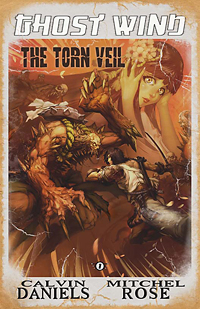
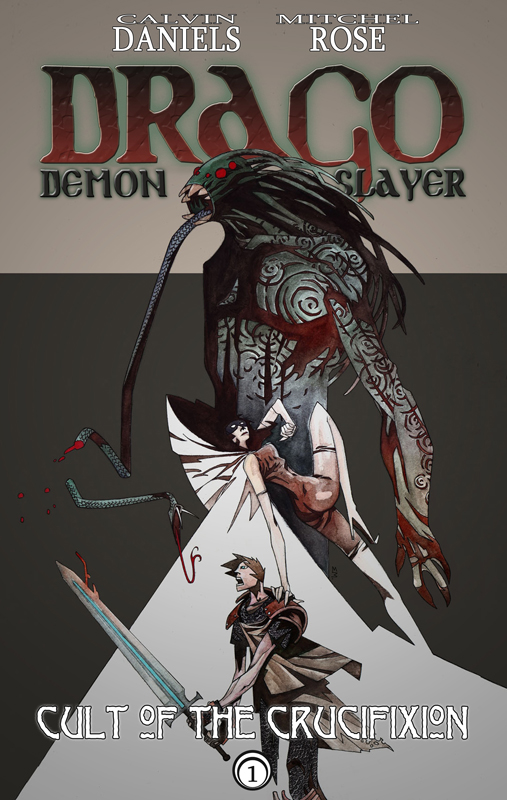
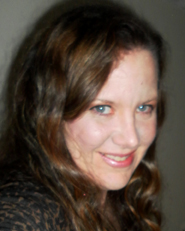 elementary school project when I was about nine years old. I loved doing it, and I received an excellent grade!
elementary school project when I was about nine years old. I loved doing it, and I received an excellent grade!